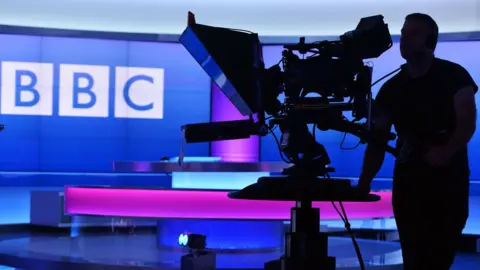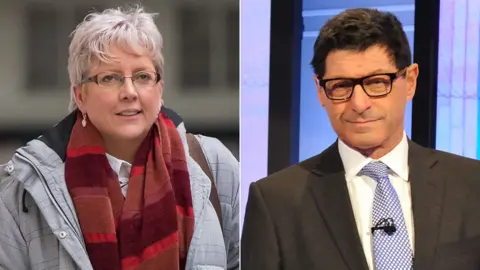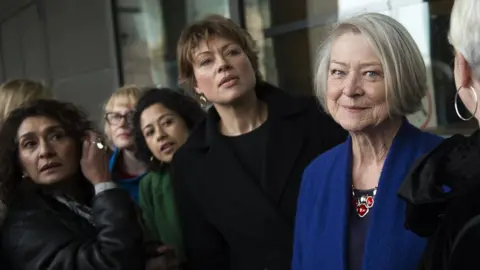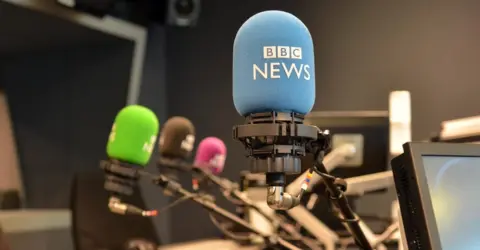Carrie Gracie tells MPs of BBC pay 'insult'
Former BBC China editor Carrie Gracie has said she is "very angry" about the way the BBC has treated some female members of staff.
The presenter, who resigned from her post earlier this month in protest at pay inequality, was giving evidence to a committee of MPs.
Gracie said she felt the BBC's response to her grievance was "an insult".
Director general Tony Hall said the BBC "got some things wrong", but added that he "admired her courage".
He insisted the BBC's system for dealing with pay complaints was "working" and equality was "at the core of what we stand for" but faced claims from one MP that the broadcaster was in "meltdown" over the issue.
They were giving evidence to the House of Commons Digital, Culture, Media and Sport Committee.
Gracie, 55, who has worked for the BBC for more than 30 years, said a grievance process over pay concluded that the reason she was paid less than male counterparts was that she had been deemed to be "in development".
She said that justification was "an insult to add to the original injury", adding: "It is unacceptable to talk to your senior women like that.
"I would never have gone to China on those terms. I asked for equal pay at the very beginning."

In emotional testimony, the presenter also said she had found the grievance process "very painful".
She spoke about the "strain of being in conflict" and that, in the process, managers had attempted to "to crush your self esteem about your work".
A review published on Tuesday said there was "no evidence of gender bias in pay decision-making" at the BBC.
But the review, conducted by auditors PwC, was rejected by BBC Women, which represents almost 200 staff members.
The issue has been in the headlines since last summer, when the BBC published a list of presenters who earn more than £150,000 per year, revealing a gap in the earnings of its best-known male and female presenters and actors.

What else did Carrie Gracie tell MPs?
Referring to other female staff members who had told her about similar grievance experiences, she said: "I feel very angry about what they put some other people through.
"I really feel angry about some of the things I've seen and heard and some of the women and the suffering they've gone through."
Gracie was appointed China editor in 2013 but stepped down in early January, saying she was dismayed to discover the BBC's two male international editors earned "at least 50% more" than their two female counterparts.
The presenter said the BBC had offered to pay her £100,000 in back pay after the inequality came to light - but said the offer "sounds like a tacit admission of pay discrimination".
She told the MPs: "The thing that's very unacceptable to me… it [the BBC] basically said in those three previous years - 2014, 2015 and 2016 - I was 'in development'."
Gracie criticised the way BBC executives had handled her situation, saying their stance was "damaging the credibility of the BBC in a completely unacceptable way".
She said: "We're not in the business of producing toothpaste or tyres at the BBC. Our business is truth. We can't operate without the truth.
"If we're not prepared to look at ourselves honestly, how can we be trusted to look at anything else in reporting honestly?"
Gracie is returning to a job in the BBC newsroom.
She said: "I could leave the BBC tomorrow and get a better paid job. I don't want to leave it in this state. It is in deep trouble and we need to sort it out and I need to be there alongside the other great BBC women, helping the BBC to sort it out."

How did the BBC respond?
Director general Tony Hall and other BBC executives also spoke at the committee hearing.
Lord Hall said: "The result of the grievance which she described to you did say very clearly that we had got some things wrong. I would that we hadn't got things wrong but we did."
The director general said Gracie had done "first rate work for the BBC" and added: "I don't want to undermine in any way the work she has done."
He added the "domination of men" in highly paid positions was wrong and the BBC is working to resolve that.
Lord Hall told the committee that pay "should not be a matter of gender - completely agree, outrageous if it was".
But he added that it was legitimate to have a "pecking order" between editors in the pay scale.
Lord Hall said: "I don't believe there is an old boys network, I believe in equality of opportunity.
"Wherever I can, properly, we have been trying to appoint women to key roles at the BBC - key roles in news, key roles as correspondents and reporters in news."
He added: "The idea of some old boys club, I abhor. That is not the way I believe that BBC should be or is."
At one point, BBC chairman Sir David Clementi turned round in his seat and apologised to Gracie, who was sitting behind him, for the mistakes the corporation had made.
He later told Conservative MP Julian Knight it was clear the BBC made a "number of errors" during the grievance process.
"I apologise for what she has been through," he said. "I recognise for individuals concerned how stressful these occasions are, they are stressful for us but it must be much more so for her. I'm actually very sorry."

Why was Carrie Gracie paid less than Jon Sopel?
 Getty / BBC
Getty / BBCBBC head of news Fran Unsworth said that when Gracie was appointed as China editor, her salary was actually higher than that of the Middle East and North America editors.
"At the time that we set Carrie's pay in that role, there was no issue around gender at all," she said.
However, after Gracie's appointment, Jon Sopel was hired to be the new North America editor. "Jon Sopel came with a different pay history," she said.
"He had been a BBC One presenter, he had been a presenter on World News. He was a former political editor of the News Channel. He was a former Paris correspondent. And he had accumulated a much higher salary than Carrie was on at the time as a presenter of the News Channel. And we did not cut his pay in asking him to go to North America."
The North America editor was on air "twice as much in peak time - and that is at a busy time in the China story", she explained.
She added: "It's a different job, the China job. It's a more features-based agenda, it's not on the relentless treadmill that something like the North America editor's job is."
She also insisted she had never described Ms Gracie's role as "part-time" but said she had apologised to the journalist at the time if her language was "loose" and had given that impression.
Lord Hall added it was "a mistake not to review Carrie Gracie's pay when the new North America editor was put in place".

Who has supported Carrie Gracie?
 EPA
EPAA number of female BBC presenters, including Kate Adie, Mariella Frostrup, Kate Silverton, Louise Minchin and Naga Munchetty, were in Westminster to support Gracie.
As Gracie spoke, former Labour deputy leader Harriet Harman was among those to tweet their support for the presenter.
Allow X content?
Gracie also said she had received more than 500 supportive emails from members of the public since her resignation, and 300 from BBC staff.

Analysis by Amol Rajan, BBC media editor

Carrie Gracie's testimony to the DCMS select committee contains several revelations. These include her rejection of back pay close to £100,000, and the fact that the BBC's letter to her about her grievance said she was "in development." Without seeing the letter in full, it's impossible to know the context, of course, but it seems a sloppy choice of words.
Revealing that she twice had breast cancer, recently suffered a family bereavement, and that her daughter had leukaemia, Gracie detailed the very difficult personal circumstances that she has endured during the recent stages of her career.
Her explanation that she spent 214 days in China, Hong Kong and Taiwan last year counters several reports in the media, and Gracie specifically expressed disappointment at negative briefing against her which she believes originates in the corporation.
Several times, Gracie made clear that she believes she is very lucky to work at the BBC, and cast "BBC Management" as a "fortress" often acting against the interests of BBC men and women. The BBC Women campaign group is now up to 190 at least, she said. And she produced a number of memorable phrases that have already been widely picked up on social media.
Perhaps her strongest line was the claim that the BBC doesn't trade in toothpaste, it trades in truth. The implied allegation that it has been less than honest has the power to hurt an organisation founded on principles of public service.

Follow us on Facebook, on Twitter @BBCNewsEnts, or on Instagram at bbcnewsents. If you have a story suggestion email [email protected].
